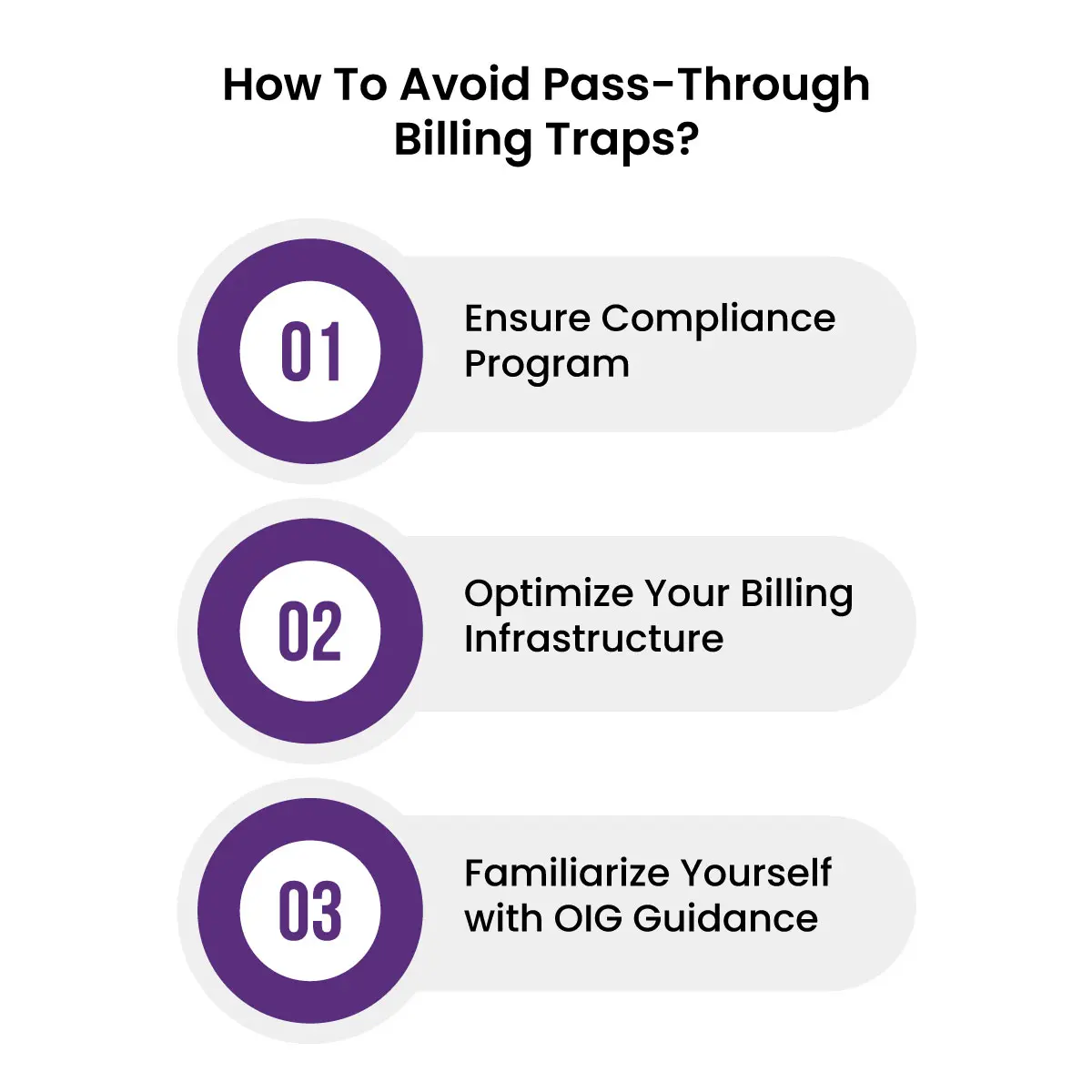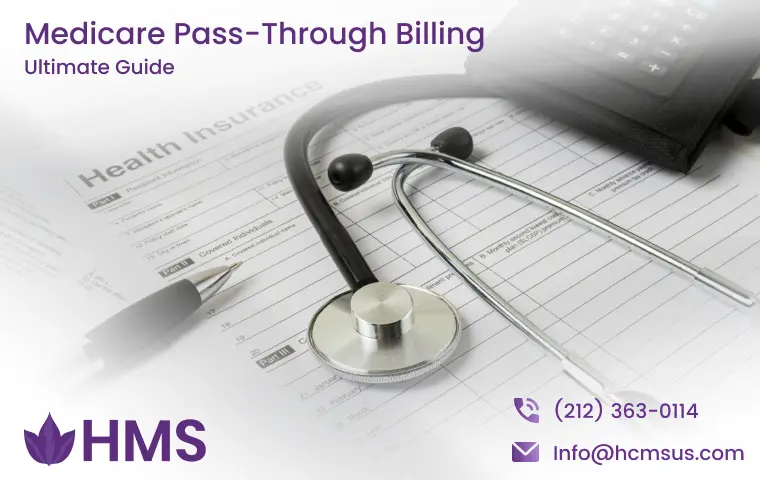While maximizing revenue is a goal for any medical practice, it's crucial to do so ethically and within the bounds of established billing practices. One term you may or may not be familiar with is "pass-through billing." Though it might seem like a simple way to boost revenue, it's actually a trap that results in fraudulent activities and can leave a bad impression on you and your practice.
Pass-through billing can lead to serious consequences, including accusations of fraudulent activity, damaging your reputation and that of your practice. Understanding this unique concept is essential. It may look like an easy path to higher profits, but the reality is far more nuanced. In this guide, we'll unravel the complexities of pass-through billing.
What is Medicare Pass Through Billing?
Pass-through billing, in the context of medical billing, refers to a scenario where a healthcare provider bills a payer (like an insurance company) for a service or item that was actually provided by another entity. The provider essentially "passes through" the cost of the service or item to the payer, often adding a markup or handling fee.
Let's break down pass-through billing with a clear example
You're a physician who orders blood tests for a patient during an office visit. You collect the blood sample but send it to an external laboratory for analysis. The lab processes the sample, generates the results, and then bills you for their services.
You, the physician, receive the lab results and then bill the patient's insurance company for the blood tests. Importantly, you include the cost of the lab's services in your bill, essentially "passing through" that expense to the insurance company. You may also add a small handling fee to cover your administrative costs associated with collecting the sample and processing the lab's bill.
Why are Pass Through Payments Prohibited?
Pass-through payments are often prohibited or heavily restricted in medical billing due to several key reasons.
Pass-through billing can create opportunities for fraudulent practices. A provider might inflate the cost of the passed-through service or bill for services not actually rendered, leading to overpayments from insurance companies and ultimately harming patients.
Pass-through billing can obscure the true cost of healthcare services, making it difficult for patients and payers to understand the breakdown of charges. This lack of transparency can erode trust and hinder efforts to control healthcare costs.
Many insurance companies have strict policies against pass-through billing, especially for services performed by entities outside the provider's direct control. This is to ensure that they're only paying for services that are medically necessary and appropriately rendered.
Violations That Occur Due to Pass Through Billing
When pass-through billing is mishandled or misused, it can lead to various violations and serious consequences.
The False Claims Act (FCA):
This law prohibits submitting false or fraudulent claims to government healthcare programs like Medicare and Medicaid. If a provider inflates the cost of a passed-through service, bills for services not actually provided, or bills for services that are not medically necessary, they could be in violation of the FCA. Penalties can include significant fines, treble damages (three times the amount of the false claim), and exclusion from federal healthcare programs.
The Anti-Kickback Statute (AKS):
The AKS prohibits offering, paying, soliciting, or receiving anything of value to induce referrals of services or items payable by federal healthcare programs. If a provider enters into a pass-through billing arrangement that involves financial incentives or kickbacks for referring patients to a specific lab or service provider, it could violate the AKS. Penalties can include fines, imprisonment, and exclusion from federal programs.
The Stark Law:
This law prohibits physicians from referring patients for certain designated health services (DHS) to entities with which they have a financial relationship, unless an exception applies. Pass-through billing arrangements can trigger Stark Law violations if a physician refers patients for DHS to an entity in which they have an ownership or investment interest. Penalties include civil monetary penalties and potential exclusion from federal programs.
Is Pass Through Billing for Labs a Scheme?
Pass-through billing for labs can indeed seem like a tempting shortcut to higher profits. But labeling it outright as a "scheme" isn't entirely accurate. The truth is more nuanced. While there's certainly potential for misuse and fraudulent activity, pass-through billing itself is not inherently illegal or unethical.
The Trap for Providers:
The real danger lies in the complexities and gray areas surrounding pass-through billing. Providers can easily fall into traps if they don't fully understand the rules, regulations, and payer-specific policies that govern this practice.
Here are some common scenarios where providers might get caught in the crosshairs:
-
Unintentional Overbilling: Misinterpreting payer policies or failing to accurately track and document the costs of lab services can lead to unintentional overbilling. This can trigger audits, investigations, and demands for refunds.
-
Hidden Financial Relationships: If a provider has an undisclosed financial relationship with a lab, such as ownership or investment interest, and refers patients to that lab for services billed through pass-through, it could violate the Stark Law and result in severe penalties.
-
Kickbacks and Referral Fees: Accepting any form of payment or incentive from a lab in exchange for patient referrals is a clear violation of the Anti-Kickback Statute, even if it's disguised as a pass-through billing arrangement.
When Pass-Through Billing is Allowed:
While it's essential to be cautious, there are legitimate scenarios where pass-through billing for labs is permissible. Here are some examples:
-
In-Office Ancillary Services: If a provider performs lab tests in their own office using their own equipment and supplies, they can generally bill for both the technical and professional components of the service, even if the samples are sent to an outside lab for analysis.
-
Certain DME (Durable Medical Equipment): Providers can sometimes use pass-through billing for DME, like wheelchairs or oxygen tanks, if they meet specific criteria outlined by Medicare and other payers.
-
Physician-Owned Labs: In certain limited circumstances, physicians may be allowed to bill for lab services performed in their own laboratory, even if it's a separate legal entity, as long as they meet specific ownership and compliance requirements.
How To Avoid Pass-Through Billing Traps?
These fraudulent activities can only be reduced if you take some proactive measures.

Ensure Compliance Program
Even if not mandated, a well-structured compliance program acts as your practice's internal watchdog, proactively identifying and mitigating potential risks. It fosters a culture of ethical billing practices and demonstrates your commitment to doing things the right way.
Optimize Your Billing Infrastructure
Implement a robust medical billing infrastructure that aligns with Ambulatory Payment Classifications (APCs) and seamlessly supports your in-house billing processes. This ensures accuracy, transparency, and efficiency in your billing operations.
Familiarize Yourself with OIG Guidance:
The Office of Inspector General (OIG) provides valuable insights into illegal billing practices and fraud within federal healthcare programs. Stay informed about OIG rules and regulations to ensure your billing practices are always above board.
Final Words
Pass-through billing, when executed correctly and within the bounds of regulations, can be a legitimate tool for medical practices. However, the potential for misuse and the severity of associated penalties make it imperative to approach this practice with utmost caution and a commitment to compliance.
By prioritizing ethical billing practices, thorough documentation, and expert guidance from trusted partners like HMS USA LLC, you can ensure your practice thrives without compromising integrity.
ABOUT AUTHOR

John Wick
As a blog writer with years of experience in the healthcare industry, I have got what it takes to write well-researched content that adds value for the audience. I am a curious individual by nature, driven by passion and I translate that into my writings. I aspire to be among the leading content writers in the world.
